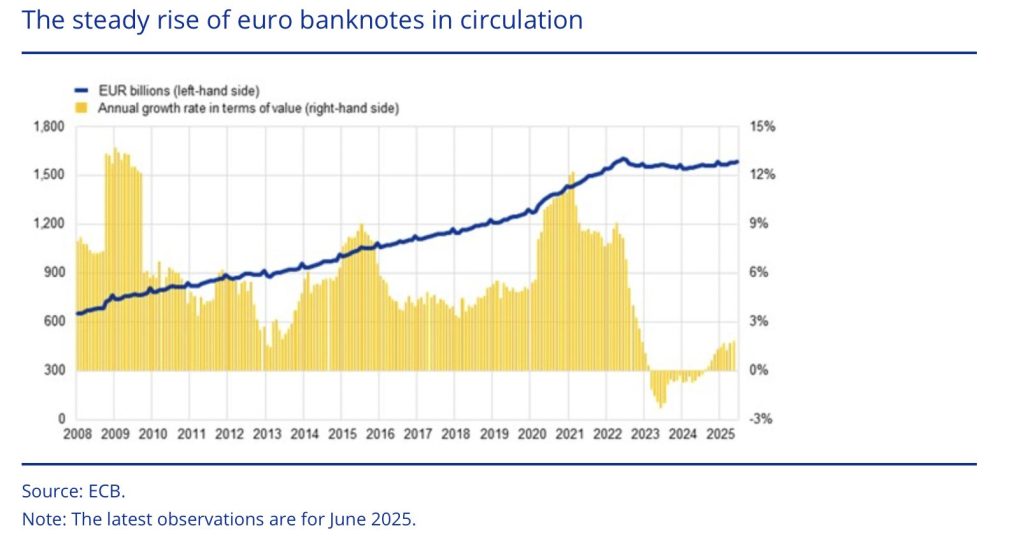ECB Doubles Down: Cash Isn’t Dead Yet Despite Digital Payment Surge
The European Central Bank just threw cold water on cash's funeral plans—turns out reports of its death were greatly exaggerated.
Old Money Meets New Tech
While contactless payments hit record highs across the Eurozone, the ECB insists banknotes will remain "widely available and accepted" for the foreseeable future. Because nothing says "21st century finance" like crumpled paper in an era of quantum computing.
The Hybrid Future
Officials claim this isn't about nostalgia—it's about "financial inclusion" for Europe's aging population and unbanked communities. Because apparently grandma needs physical euros to buy her bratwurst while crypto bros trade NFTs of those same sausages.
The irony? This comes as ECB digital euro trials accelerate. Guess even central bankers hedge their bets—just like your average crypto trader during a bear market.
A Dual Payment Future: Cash and Digital Euro
The ECB explains that while digital payments are growing rapidly, especially following the COVID-19 pandemic, Cipollone made it clear: physical cash isn’t being phased out. Instead, it’s being preserved and modernised to coexist with digital innovations, such as the upcoming digital euro.
To support this dual system, the European Commission’s 2023 Single Currency Package introduced two legislative proposals.
One protects the legal tender status of euro cash, and the other lays the groundwork for a digital euro. Together, these laws aim to ensure that Europeans continue to have a wide range of payment choices—both online and offline.
Cash Still in High Demand Across Europe
Despite digital trends, the ECB reports that euro banknotes remain a trusted store of value. Over €1.6 trillion worth of euro banknotes—around €5,000 per eurozone citizen—is currently in circulation. While usage dipped slightly during interest rate hikes, cash demand continues to rise at an annual rate of 2.3% in volume.

Cipollone stresses that during past crises—the 2008 financial crash, the sovereign debt crisis, and the pandemic—cash demand surged, reinforcing its role as a stabilising tool in uncertain times. “Cash is always there when you need it,” he notes.
Access to Cash Must Be Protected, Says ECB
One of the ECB’s key concerns is making sure there is equitable access to cash services. As bank branches close and ATMs become less common, rural and underserved regions risk being cut off. To counter this, the proposed Legal Tender of Cash Regulation includes mandatory monitoring and assessment of cash access points across the eurozone.
The ECB says it is working with national central banks to create metrics that account for geographic and population differences. Cipollone stresses that commercial banks have a duty to maintain both withdrawal and deposit services—essential for keeping cash circulating in local economies.
No-Cash Policies Face Legal Pushback
Retailers and public services increasingly refusing to accept cash is another red flag for the ECB. The central bank has criticised “no cash” signs and has called for rules to enforce cash acceptance, particularly in essential services like public transport.
The Court of Justice of the European Union supports this stance, affirming that cash must be accepted unless both parties agree otherwise. The ECB also plans to modernise banknotes—both in design and anti-counterfeit technology—to ensure they remain practical and appealing well into the digital age.
The ECB is clear—cash is not going anywhere. Instead, it’s being future-proofed to stand strong alongside the digital euro, offering Europeans flexibility, security, and inclusivity in how they pay.
ECB Approves Central Bank Money for DLT Transactions
In July, the ECB approved a two-track plan that will utilise central bank money for distributed ledger technology (DLT) transactions.
The first short-term track approach, dubbed “Pontes”, will connect DLT platforms with Eurosystem TARGET services, to be launched by 2026. The track will ensure the free FLOW of cash, securities and collateral across Europe.
Meanwhile, before the launch of the Pontes pilot in Q3 2026, the ECB will consider DLT-based trial and experiment requests.

